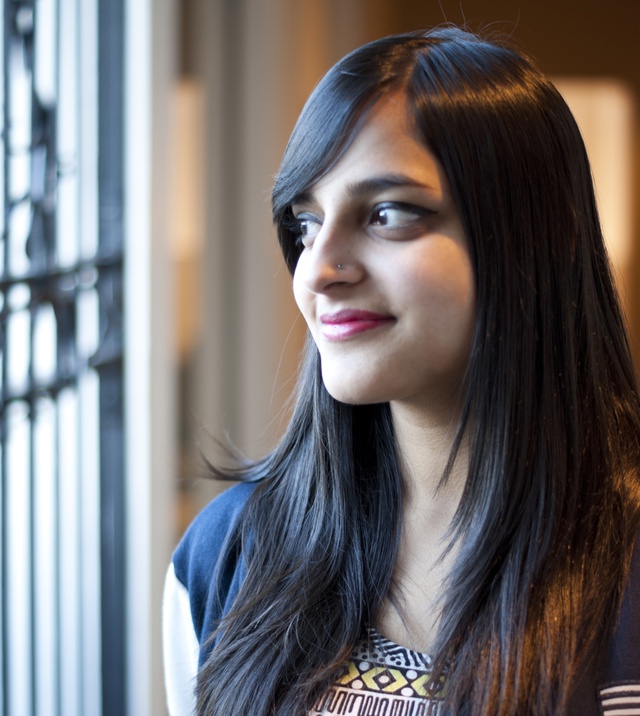Women and non-binary artists are making waves in contemporary music in Scotland
10.07.23
Arusa Qureshi is a writer and editor based in Edinburgh. She is the current Editor of Fest and the former Editor of The List and writes mostly about music, most recently Flip the Script – a book about women in UK hip hop, published by 404 Ink. Her work has appeared in the Scotsman, Clash, the Guardian, GoldFlakePaint, Time Out, the Quietus, NME and more. She is on the board of the Scottish Music Centre and is the co-curator of the award-winning Amplifi series at Edinburgh's Queens Hall.
Twitter @arusaqureshi
Instagram @arusaqureshi
This post is the second in a series of articles covering the arts in Scotland beyond Edinburgh Fringe. Click to read our other posts by Ashley Davies and Karl Taylor.
As we approach summer festival season, and the annual deluge of line-ups, bills and stage splits begins to stream in, there’s a familiar refrain that also tends to make an appearance: where are all the diverse and marginalized genders? It’s tired and incessant, accompanied by long sighs and eyerolls, but we all understand the need for it to be verbalised. Thanks to the Keychange initiative, which encourages festivals, organisations and companies to sign up to a gender balance pledge, the landscape has shifted in recent years but there is still the looming question of why certain festivals and events still find it so hard to programme women and non-binary people, and in prominent positions too.
This conversation is prevalent in Scotland, especially as the home of the world's largest performing arts festival and as a country that takes pride in its numerous major year-round music events. But it’s surprising that the question of gender parity continues to be such a hot topic, considering how fruitful Scotland’s contemporary music scene currently is, thanks predominantly to the artists of diverse and marginalized genders, with a particular focus on people who identify as women, producing both exceptional and boundary-pushing work. Though it has been traditionally male dominated, in terms of artists breaking through and industry behind the scenes, Scotland’s musical landscape is so much more than just white, male indie guitar bands and there are plenty of people working hard to showcase the richness and diversity that exists, so that it can be a welcoming and inclusive place for all.
Hen Hoose, for example, is a songwriting collective and music production house based in Glasgow and founded by Tamara Schlesinger. The all-female and non-binary group includes Scottish artists, writers and producers, who all collaborate, support each other and work together to create more opportunities for women in music in Scotland. The group’s first album, Equaliser, which arrived in 2021 is not only a terrific project, but serves as evidence of Hen Hoose’s technical prowess, offering a clear representation of how many phenomenal women and non-binary artists there are in the Scottish music industry and what Scotland itself has to offer further afield.
Another group similarly making waves is Popgirlz Scotland, which serves as a support group for female-identifying, non-binary and trans artists in the Scottish music scene. Founded by Rachel Alice Johnson and Josephine Sillars, Popgirlz is all about uplifting and celebrating, but also drawing attention to issues like gender discrimination in Spotify playlists and the safeguarding in music.
As artists in their own right, Rachel (who goes by Kohla) and Josephine, as well as the 100+ members of Popgirlz, epitomise the notion that the most exciting work currently taking place is happening on the margins and in genres that may not typically be associated with Scotland. In the electronic music world, we have TAAHLIAH, the Glasgow DJ and producer, who has risen from the underground to fill dancefloors the world over, becoming BBC Introducing’s Dance Artist of the Year in 2022. Then there’s the beautifully narrative-driven stylings of pop singer-songwriter Katie Gregson-MacLeod, who became a viral TikTok sensation with her single ‘Complex’.
Elsewhere, Uninvited are a four-piece rock band, who claimed the top spot ahead of 4,000 other entries in Radio 1’s Live Lounge Introducing Search last year, and K4CIE is the co-founder of DJ collective and events platform Peach, who host parties and events with a focus on women in hip hop. Also on the rise, we have indie-soul artist Brooke Combe; R&B girl group 4Tune; house and techno producer/DJ Nightwave; audacious hip-hop trio The Honey Farm; BBC Music Introducing Scottish Act of the Year 2023 Terra Kin; and rapper and harpist Anise Pearson, aka Queen of Harps.
There are far too many talented and noteworthy artists of diverse and marginalized genders to name, but ultimately, Scotland’s music scene is not lacking in terms of diversity and variety. So going back to the original question, why do we still have to fight for our inclusion in national and international line-ups and for a seat at the table? Groups like Hen Hoose, Popgirlz and Peach are putting in the effort to place women, non-binary and trans people at the forefront in Scotland, bypassing the gatekeepers in the process. There is work to be done but there’s certainly no shortage of people taking the lead.
With the festival season fast approaching all eyes tend to be on Edinburgh in August, if you're working on or experiencing any new and exciting projects in the rest of Scotland's huge and varied cultural space we'd love to hear from you.
If you'd like to keep up to date with all our blog posts, important and interesting stories in the worlds of theatre, arts and media, plus job ads and opportunities from our industry friends, sign up to our daily media briefing at this link.



